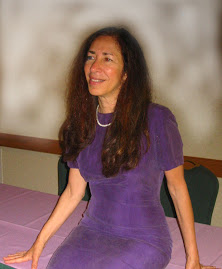When my husband had to choose which colleges to apply to, way back before I knew him, he consulted the Barron’s Guide to Colleges and became overwhelmed--there were too many schools, too much information, and he hadn’t a clue how to narrow down the options. And so, he threw the book down the stairs in frustration. It landed at the bottom step, splayed open to a page describing Ithaca College. And that’s the way my husband decided that he would go to Ithaca College, which is the school he graduated from.
That’s not a process I would recommend—throwing books and trusting that fate will make them land opened to the page bearing the right answer for you. And yet, though that particular approach seems far-fetched, it’s not actually that far off from the methods many of use for deciding which path to follow. Typically, when faced with a tough decision, we talk to friends, we try to consult our intuition, we see what the universe makes happen, trusting that the cosmic breeze will make the “right choice” drift our way. Some of us consult oracles and prophets. Few of use a scientific process to arrive at a conclusion, other than maybe listing pros and cons.
And yes, there are great processes you can use to narrow your options down. If you need help getting over anxiety that arises when you confront your choices, these processes can be of enormous help. They can help you to have much more clarity about what your choices actually are. And by the way, I’m not saying there’s no place for intuition. Rather, I’m suggesting that first, get clear on what’s already in your mind and heart by using the help of some great step-by-step methods, and then, if you want to add intuition to the mix, go ahead.
Here are some pointers and practices that may be of help:
- Go through your own process before talking to everyone else. Women in particular tend to like to collect everybody’s opinion before making a decision. While talking it through with your loved ones can be valuable, it can also steer you away from your own wisdom. Find out what you really think before investigating what your brother, neighbor, astrologer, and boss think. Trust that you do have some wisdom buried within, your own inner radar.
- Enlist the help of a partner or professional coach. This suggestion may seem to contradict the first step, but it really doesn’t. Your partner or coach should serve as a sounding board, someone you can discuss your thought processes with. This person can reflect back to you what they hear and notice as you talk about your options—which is very different from telling you their own opinion. This is where a life coach can be so helpful.. Life coaches are trained to help you to see through your mental fog to know what’s in your own mind or your own heart.
- Try the Wise Choice Process developed by Skip Downing. This involves first asking yourself, “What are my choices?” and writing them all out. This activity alone can help you to see options that you haven’t considered. It can also help you to recognize that you have lots of options available. The next step is to list the probable outcome of pursuing each choice. Once you have those options delineated, discuss them with your partner or coach. The next step is to decide which choice you will commit to, but you may not be ready for that yet. Try the 10-10-10 Process, below, first.
- Use the 10-10-10 Process created by Suzy Welch. Here, you take the options you listed in the Wise Choice process, and for each one, write what the probable outcome of choosing that option will be in 10 minutes, 10 months, and 10 years. Go through this same regimen with each option on your list.
- Use an Enhanced Version of the Pros and Cons System. Here, you devote a separate page to each of the options you listed in the Wise Choice Process. For each option, list out all the pros in one column, and all the cons in another. Then, assign each item a point value between 1 and 10. Count up all the values in the pro column, and then all the values in the con column to get a sense of what holds the most advantage for you. If the “winning” choice isn’t the one that feels best to you, it might be time to go talk to your friends, your astrologer, and of course, your coach.
Dr. Hiyaguha Cohen works with clients by telephone, Skype, and email. She also sees Hawaii counseling clients in person. Visit her website at www.thelifechangecoach.com.






